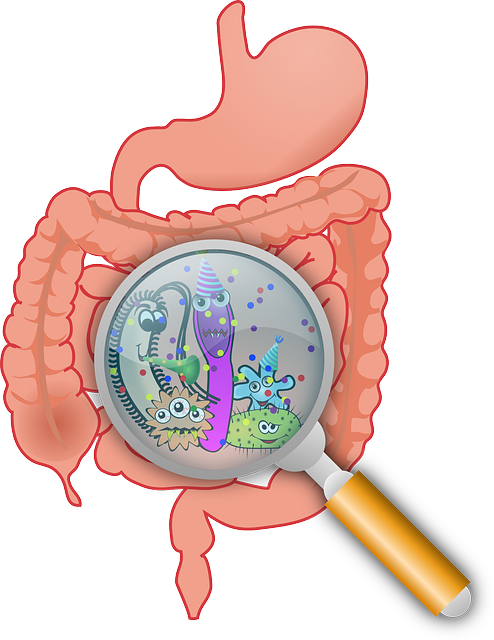Let’s talk about gut health…
Beth Joscelyne, 2018 SPCNM Graduate Practitioner
The connection between our digestive health and overall health (mental & physical) has been talked about a lot over recent years, to the point where its existence is well accepted within both conventional and alternative medicine circles. So with this in mind, let’s explore the role of the gut a little further, and look at some proven dietary and lifestyle strategies that promote healthy digestive function and support a healthy gut microbiome.
About the ‘microbiome’…
Our gut is home to a sizeable, and very active community of microorganisms including a diverse range of bacteria, which has been shown to provide many beneficial functions, including:
- Promoting optimal gastrointestinal function
- Protecting us from harmful microbes and infections
- Regulating our metabolic activities
- Playing a key role in the function of our immune system
- Playing a role in prevention of some diseases
- Regulation of the intestinal barrier function
On the flip side, an imbalanced microbiome (also known as dysbiosis) is now known to be connected to a range of health conditions and diseases. This includes autoimmune conditions (e.g. type 1 diabetes, Hashimoto’s thyroiditis, rheumatoid arthritis, Crohn’s disease and ulcerative colitis), autism, obesity and depression.
About our intestinal barrier function…
As touched on above, one very important role of the gut microbiome is the regulation of the intestinal barrier function, hence why dysbiosis and ‘leaky gut’ commonly go hand in hand.
Ongoing research continues to support the hypothesis that the intestinal barrier plays a critical role in health and disease. When functioning optimally, it is designed to prevent foreign substances from entering the body (yes the gut is technically considered to be outside the body), while still allowing absorption of beneficial and essential nutrients.
As with dysbiosis, a number of diseases are linked to increased intestinal permeability. These include celiac disease, food intolerances and allergies, irritable bowel syndrome (IBS), and inflammatory bowel disease. More recently, research is now suggesting a link between increased intestinal permeability and obesity, autoimmune diseases, depression, anxiety and metabolic diseases such as diabetes mellitus types 1 & 2. While there is still much to learn, it has become very clear healthy intestinal barrier function is incredibly important to our long term health and wellbeing.
So then, let’s talk about strategies to promote healthy gut function…
Diet is one of the key factors influencing microbiota composition. Key dietary strategies for healthy microbiome and intestinal barrier function include:
- Prebiotic foods – these are non-digestible foods that stimulate the growth and/or activity of beneficial gut bacteria. Prebiotic foods include garlic, onion, leeks, asparagus, oats, apples, flaxseeds, seaweed, chicory, dandelion greens, Jerusalem artichoke,
- Eat a diet that suits you – we are all unique. Increased intestinal permeability is linked to food intolerances. When we eat food we have become sensitised (or intolerant) to inflammation is the result. Ignoring suspected food intolerances is therefore not a good idea. It is recommended to work with a naturopath if you suspect you have food intolerances; they most likely will implement a gut-healing protocol, with the ultimate aim of re-introducing culprit foods at a later date once gut healing has taken place.
- Fermented foods – these provide a dietary source of probiotics. Examples include sauerkraut, kimchi, coconut water & water kefir, milk kefir, kombucha and miso.
Essentially, the take home message is – diet matters – and no amount of probiotic supplementation can replace a good diet.
Some non-diet related strategies that promote healthy gut microbiome and intestinal barrier function include:
- Probiotic supplementation – however, it is important to understand the health benefits received from probiotic supplements are strain specific. In other words, it is critical to choose the right probiotic supplement for the right condition – ensure the strains are listed on the label, and that their inclusion in the supplement is backed by research.
- Stress management – Both psychological and physical stress have been proven to contribute to gut dysbiosis, as well as many other health conditions. It is therefore super important to have daily and weekly practices in place that promote relaxation and parasympathetic nervous system activity to increase your resilience and tolerance to stress. Great examples include regular exercise, yoga, meditation, walking in nature or creative activities like art.
To finish up… Please ‘love your guts’. And, if you suspect you have leaky gut or gut dysbiosis it is recommended you work with a qualified health professional. Ask around for recommendations or come and visit one of our naturopathic practitioners at Paua Clinic.
References:
Barin, J. G., Tobias, L. D., & Peterson, D. A. (2015). The microbiome and autoimmune disease: Report from a Noel R. Rose Colloquium. Clinical Immunology, 159(2), 183–188. https://doi.org/http://dx.doi.org/10.1016/j.clim.2015.05.009
Belkaid, Y., & Hand, T. (2014). Role of the microbiota in immunity and inflammation. Cell, 157(1), 121–141. https://doi.org/10.1016/j.cell.2014.03.011
Bischoff, S. C., Barbara, G., Buurman, W., Ockhuizen, T., Schulzke, J.-D., Serino, M., … Wells, J. M. (2014). Intestinal permeability – a new target for disease prevention and therapy. BMC Gastroenterology, 14(1), 189. https://doi.org/10.1186/s12876-014-0189-7
Corridoni, D., Pastorelli, L., Mattioli, B., Locovei, S., Ishikawa, D., Arseneau, K. O., … Pizarro, T. T. (2012). Probiotic bacteria regulate intestinal epithelial permeability in experimental ileitis by a TNF-dependent mechanism. PLoS One, 7.
Fond, G., Boukouaci, W., Chevalier, G., Regnault, A., Eberl, G., Hamdani, N., … Leboyer, M. (2015). The “psychomicrobiotic”: Targeting microbiota in major psychiatric disorders: A systematic review. Pathologie Biologie, 63(1), 35–42. https://doi.org/10.1016/j.patbio.2014.10.003
Guarner, F., & Malagelada, J.-R. (2003). Gut flora in health and disease. The Lancet, 361(9356), 512–519. https://doi.org/10.1016/S0140-6736(03)12489-0
Larsen, N., Vogensen, F. K., van den Berg, F. W. J., Nielsen, D. S., Andreasen, A. S., Pedersen, B. K., … Jakobsen, M. (2010). Gut Microbiota in Human Adults with Type 2 Diabetes Differs from Non-Diabetic Adults. PLOS ONE, 5(2), e9085.






